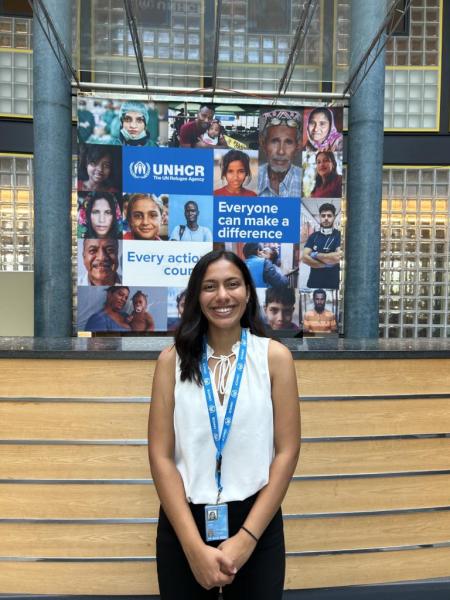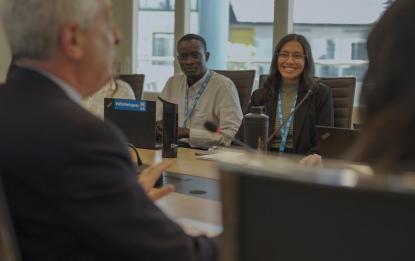Secondary menu
A Summer Internship at the UNHCR: Engaging with Human Rights Instruments to Strengthen International Protection for Refugees and Asylum Seekers
By: Yasmin Rajwani (2L - JD/MGA)
 Photo: Yasmin Rajwani (author) at the UNHCR
Photo: Yasmin Rajwani (author) at the UNHCR
This past summer, I had the pleasure of completing an internship at the Office of the United Nations High Commissioner for Refugees (UNHCR) in Geneva, Switzerland. With a background in international development and having worked and volunteered in immigration and refugee affairs, this was a great opportunity to blend my evolving legal toolkit and my interest in humanitarianism and dignified development.
The Office of the High Commissioner for Refugees (UNHCR) works for the international protection of refugees, asylum seekers, and people at risk of statelessness. My internship was within the Division of International Protection, which provides guidance on legal and policy issues and contributes to the development of international law to strengthen the protection environment by developing and ensuring international law and standards are appropriately employed for displaced individuals. I worked within the Human Rights Liaison Unit (HRLU), which liaises between international human rights mechanisms and UNHCR’s field teams to enable colleagues to operationalize international human rights law more effectively.
During my internship, I contributed meaningfully to much of HRLU’s work. My work included engaging directly with human rights mechanisms, conducting research on international protection issues, coordinating the UNHCR’s engagement at the Human Rights Council, and drafting guidance on international human rights treaties for field colleagues.
Engaging with Human Rights Mechanisms
Throughout the internship, I prepared several submissions to human rights treaty bodies, such as the Human Rights Committee, which oversees the implementation of the International Covenant on Civil and Political Rights and the Committee Against Torture, which monitors the implementation of the Convention against Torture and Other Cruel, Inhuman or Degrading Treatment or Punishment. I drafted feedback reports for field colleagues on recent country reviews through the Human Rights Council’s Universal Periodic Review process and crafted reports on the relevance of treaty bodies’ Concluding Observations to UNHCR’s operations in diverse country contexts.
Coordinating UNHCR’s engagement at the Human Rights Council
A key task involved in my role was the logistical and thematic coordination of UNHCR’s engagement at the 56th session of the Human Rights Council, which took place at the Palais de Nations in Geneva from mid-June to mid-July. I engaged with global colleagues and thematic experts in our division to gauge our priorities and explore potential opportunities of interest based on UNHCR’s current work. During the four-week session, I attended and took notes at various plenary dialogues and side events and served as the UNHCR focal point for interventions at Council sessions.
After the session ended, I drafted briefing notes on the events pertaining to topics on Afghanistan, Russia-Ukraine, Syria, Sudan, sexual orientation and gender identity, racism, migrants and trafficking in persons, among other pertinent topics. This was a unique opportunity to work on pressing human rights issues and explore intersections with refugee and humanitarian law, cross-referencing our regional bureau and country team’s previous inputs to the mechanisms to be able to produce topical briefing notes for colleagues’ fieldwork.
Photo: Yasmin Rajwani (author) participating in a meeting
Conducting Research on International Protection Issues and Interpreting Treaties
I also had the opportunity to complete and contribute to country-specific human rights profiles, collating various states’ human rights records and engagement with core international human rights instruments. Particularly, I focused on profiles for Afghanistan and Egypt, to support colleagues’ strategic planning and engagement in their field contexts. Responding to colleagues’ requests, I conducted specific research on Afghanistan’s status at the UNGA and the Human Rights Council, researching what accountability measures exist for the Taliban, currently recognized as de facto authorities, helping field colleagues to better understand the ways in which they can leverage the work of international human rights mechanisms. This entailed database research and analysis of relevant Concluding Observations from several treaty bodies on issues of pertinence to UNHCR.
I also worked on the development of a guidance note for UNHCR colleagues on the International Convention for the Protection of Migrant Workers, highlighting key opportunities for UNHCR. This involved researching the Convention’s Articles, academic papers, and country submissions to the Committee to better understand how the Committee has interpreted the Convention and the protection it affords to forcibly displaced people. This presented a particularly unique opportunity for critical analysis as much of the work I undertook was to understand the Convention’s relevance to displacement and statelessness, despite the fact that migrants and migrant workers do not directly fall within UNHCR’s mandate. The final product was a drafted guidance note which will be made available to UNHCR colleagues globally in due course.
Reflections
My internship experience at UNHCR was enriching, eye-opening, and rewarding. I was able to gain familiarity with human rights mechanisms and their interactions with refugee and humanitarian law, and was able to witness firsthand through case-specific work that where national mechanisms are lacking, international legal frameworks and regional mechanisms have the potential to be leveraged as advocacy tools to create better protection environments for forcibly displaced persons. Being directly engaged in this work has been incredibly inspiring amid a time where intensifying global crises have put on display the shortcomings of our international, non-binding legal architecture.
Personal highlights of mine included having an inspiring conversation with Mr. Filippo Grandi, the High Commissioner for Refugees, on his key learnings as a humanitarian and the unique role of international protection in the contemporary landscape as well as a conversation with Special Rapporteur on climate change Elisa Morgera, exploring what intensifying climate change means for displacement in the global and regional planes. I also enjoyed the opportunity to be part of the agenda-setting consultations and meetings of the recently formed Platform of Independent Experts, consisting of the Special Rapporteur on Migrants, the Special Rapporteur on Trafficking in persons, and Rapporteurs from regional human rights commissions, being able to witness the value of collaborative and coordinated approaches to bolster human rights work. Working in Switzerland and getting to explore its beautiful nature, fondue, and chocolate was a great joy, and it was truly inspiring to experience the energy of the city of Geneva as an international cooperation and humanitarian hub.
As displacement intensifies and mixed movements become a common reality, there is an increasing need for international law and the humanitarian sector to respond in an equitable and effective manner. This experience has allowed me to dip my toes into the work of international protection and international law more broadly, highlighting the large gaps that exist but also underscoring the immense potential value of the legal advocacy work being done across the globe to combat human rights violations and provide displaced individuals access to justice.
I am deeply grateful to the IHRP team and program for enabling this experience to come to fruition. It truly was an incredible summer, and I look forward to continuing to add to my skillset in this area as I continue my legal studies.

